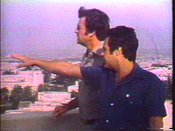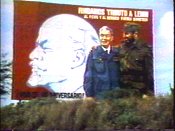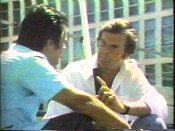 |  |  |  |  |
 | ||||
Stan Remembers: 1977 Cuba a mixture of heaven and hell
Reporter: Stan Atkinson Photographers: KOVR 13 News, KCRA News 1961 Cuba: the Bay of Pigs. The event remains an ugly chapter in American history. The CIA masterminded the invasion of Cuba using Cuban exiles living elsewhere. It ended in disaster. Sixteen years later, working for KCRA, Stan Atkinson's and crew were the first US local TV journalists allowed back into Cuba to film. It took them four months to get permission to go into Cuba. Once there, Stan was paired with a former newsman, award-winning Cuban photographer Roberto Salas. Stan Atkinson: Salas took great pains to make sure we saw what we wanted to see. Of course, he also had to show us what Fidel Castro wanted us to see.
Subsidized housing, subsidized resort vacations for poor campesinos and major expansion projects, like a highway that ran the length of the country. Though I despise Marxism, it was clear that communism was working for a lot of Cubans in 1977. Most people were better off than they had been under the Batista regime that Castro had overthrown, and it was easy to see why. The entire island was kept afloat by Russian rubles - about $2 million a day worth - from Moscow to Havana, with love. But the love went away with the end of the cold war. And today - without soviet support, economically - Cuba hangs by its fingernails. Recently I saw Roberto Salas on American TV, pitching his marvelous new book about the Cuban revolution. Back in 1977, I asked him if he thought Cubans would ever have political freedom of choice.
Roberto Salas / 1977: "No, I don't think so. Because you have to go back to basic concepts of what socialism is and what Marxism is, and how our government is constituted." Stan Atkinson / 1977: "Then how do you say that the press and society can be free?" Roberto Salas / 1977: "Well, it is free. It is free for us. Because it's free in defense of the interest of the people. It's free in defense, in defense, and it favors and it helps all, it can help the society itself." Stan Atkinson / 1977: "Don't you think there are people out there who might want more than one political party?" Roberto Salas / 1977: "This, we don't deny this. We have never said that, that we have 100-percent backing of our system. But our system is a system of the majority."
And the government made no secret of how it ensured that majority. Spying and reporting any disloyalty of neighbors was openly encouraged. Still, the things that had always delighted Americans about Cuba were still there, and we got to sample them all. Music, nightlife, the wonderful energy of an exciting and excitable people. And the beaches, the spectacular beaches. Among them was Veradero Beach, where in the early 1930's my parents went to live and made a baby: me. They came back to California for the birth, but my mother always told me how she enjoyed swimming in the ocean off Veradero while she was in her pregnancy. The Cuban people were great, very open, friendly and loving their fun. A stark contrast to the somber, bored and boring Russian sailors we saw drinking in the nightclubs.
Everywhere kids followed us. We passed out Frisbees and chewing gum. Cuban youngsters had never known bubble gum. We gave lessons. A powerful memory was our trip to the Bay of Pigs. Shell fragments were still on the beach. The Cuban perspective of the ill-fated invasion was a rallying point for Fidel's new government. It was an American-mounted invasion that cost more than 350 lives (and millions of US dollars to buy the freedom of the invaders taken prisoner). It was a major loss of face when President Kennedy denied backing the plan. Fidel and his people had scored a big one and left John Kennedy with the greatest humiliation of his legacy. But of course, it wouldn't be a trip if we didn't get into a little trouble. And the trouble came when we, momentarily, forgot we were in a country with no freedom of press. We tried to shoot a major fire at the Havana Opera House and soon found ourselves surrounded by soldiers. They demanded our film and told us we were headed for prison until an American-educated colonel stepped in. He saved our "you-know-what's," telling us he would keep the film. But secretly, he gave it back to us the next day. That allowed him to save face and for us to end up with our film. After all that, the pictures didn't turn out. They were too dark to use. Back to top of the page Back to the Stan Atkinson page |
News Scripts News Team Question of the Day Sites & Links
Stan Remembers: Saddam out of control, Kuwait in flames Stan Remembers: Father Hoa and his little army Stan Remembers: On the road with LBJ Stan Remembers: Way news is covered has changed since the Donner Ridge forest fire Stan Remembers: Interview with the madman, Charles Manson Stan Remembers: Vietnam and BT Collins, fates intertwined Stan Remembers: Dangerous days covering El Salvador Stan Remembers: The tragedy in Cambodia Stan Remembers: Sometimes covering the news risks your safety
6 am Daybreak News at Noon News at 5:00 News at 6:00 THE 10:00 News Saturday 5:00 Saturday 11:00 Sunday 6:30 Sunday 11:00 |
 | ||||




